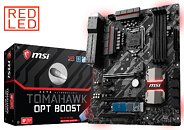- Joined
- Oct 9, 2007
- Messages
- 47,655 (7.43/day)
- Location
- Dublin, Ireland
| System Name | RBMK-1000 |
|---|---|
| Processor | AMD Ryzen 7 5700G |
| Motherboard | Gigabyte B550 AORUS Elite V2 |
| Cooling | DeepCool Gammax L240 V2 |
| Memory | 2x 16GB DDR4-3200 |
| Video Card(s) | Galax RTX 4070 Ti EX |
| Storage | Samsung 990 1TB |
| Display(s) | BenQ 1440p 60 Hz 27-inch |
| Case | Corsair Carbide 100R |
| Audio Device(s) | ASUS SupremeFX S1220A |
| Power Supply | Cooler Master MWE Gold 650W |
| Mouse | ASUS ROG Strix Impact |
| Keyboard | Gamdias Hermes E2 |
| Software | Windows 11 Pro |
Back in April, we reported motherboard manufacturer MSI bundling Intel's Optane cache SSD with a few of its mid-range motherboards. While not free, the bundle would be slightly cheaper than the sum of its parts (buying the board and SSD separately). At the time we predicted that other motherboard vendors could launch similar bundles. It turns out that Intel is indeed coordinating motherboard + Optane SSD bundles.
In a bid to boost sales of its 200-series chipset motherboards and Core "Kaby Lake" processors, Intel is coordinating bundles of motherboards across brands with its Optane cache SSDs. Analysts predict that this could be an inventory-clearing exercise by Intel, because it plans to launch its next-generation Core "Coffee Lake" processors by late-August, 2017. "Coffee Lake" will see the introduction of six-core processor SKUs to Intel's mainstream-desktop platform, which is currently led by the quad-core i7-7700K "Kaby Lake."

In all likelihood, Intel could change the socket with "Coffee Lake," and introduce a new chipset, making current 200-series chipset boards and Core "Kaby Lake" processors bad options. The company already pushed two generations of processors, the 6th generation Core "Skylake" and 7th generation Core "Kaby Lake" through the LGA1151 platform, which has two generations of chipset - 100-series and 200-series. Given that Intel isn't going to transition from its current 14 nm process in the near-term, a 14 nm six-core processor could likely have higher electrical requirements than what the LGA1151 socket can afford. Add to that, Intel's quad-core "Kaby Lake" parts already ship with TDP as high as 91W.
In the meantime, Intel has its eyes on the over 130 motherboard models that are based on 200-series chipset, and support Optane SSD caching.
View at TechPowerUp Main Site
In a bid to boost sales of its 200-series chipset motherboards and Core "Kaby Lake" processors, Intel is coordinating bundles of motherboards across brands with its Optane cache SSDs. Analysts predict that this could be an inventory-clearing exercise by Intel, because it plans to launch its next-generation Core "Coffee Lake" processors by late-August, 2017. "Coffee Lake" will see the introduction of six-core processor SKUs to Intel's mainstream-desktop platform, which is currently led by the quad-core i7-7700K "Kaby Lake."

In all likelihood, Intel could change the socket with "Coffee Lake," and introduce a new chipset, making current 200-series chipset boards and Core "Kaby Lake" processors bad options. The company already pushed two generations of processors, the 6th generation Core "Skylake" and 7th generation Core "Kaby Lake" through the LGA1151 platform, which has two generations of chipset - 100-series and 200-series. Given that Intel isn't going to transition from its current 14 nm process in the near-term, a 14 nm six-core processor could likely have higher electrical requirements than what the LGA1151 socket can afford. Add to that, Intel's quad-core "Kaby Lake" parts already ship with TDP as high as 91W.
In the meantime, Intel has its eyes on the over 130 motherboard models that are based on 200-series chipset, and support Optane SSD caching.
View at TechPowerUp Main Site






 j/k.
j/k.
